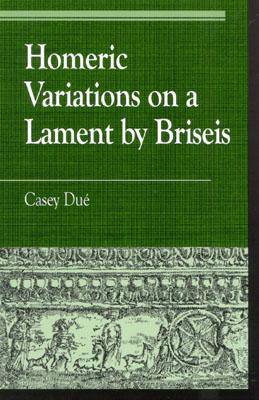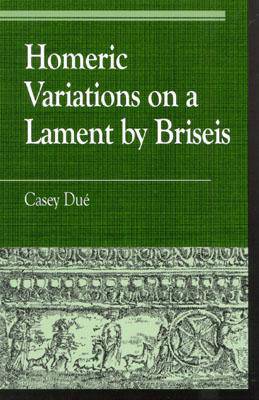
- Afhalen na 1 uur in een winkel met voorraad
- Gratis thuislevering in België vanaf € 30
- Ruim aanbod met 7 miljoen producten
- Afhalen na 1 uur in een winkel met voorraad
- Gratis thuislevering in België vanaf € 30
- Ruim aanbod met 7 miljoen producten
Zoeken
Omschrijving
Casey Dué examines the figure of Briseis, the concubine of Achilles in theIliad, as an example of the traditional artistry enabled by a complex and self-contained oral poetic system. Briseis' lament for Patroclus inIliad 19 hints at her role in the larger epic tradition. Dué argues that Briseis' role in theIliad is enormously compressed, both in relation to theIliad and the entire tradition of the epic cycle. Through a close reading of Homeric passages, Homeric Variations on a Lament by Briseis shows how theIliad refers to expanded and alternative traditions about Briseis even while asserting its own version of her story.
It seems likely that there were at least two variations on the story of Briseis, because of the two-fold pattern she fulfills in ancient references. In one variation she is a wife whose husband is killed by Achilles in the sack of his city; in another she is an unmarried girl, the daughter of a king, whose father is killed when Achilles captures her town. OurIliad alludes to multiple variations on these two basic themes.
It seems likely that there were at least two variations on the story of Briseis, because of the two-fold pattern she fulfills in ancient references. In one variation she is a wife whose husband is killed by Achilles in the sack of his city; in another she is an unmarried girl, the daughter of a king, whose father is killed when Achilles captures her town. OurIliad alludes to multiple variations on these two basic themes.
Specificaties
Betrokkenen
- Auteur(s):
- Uitgeverij:
Inhoud
- Aantal bladzijden:
- 240
- Taal:
- Engels
- Reeks:
Eigenschappen
- Productcode (EAN):
- 9780742522183
- Verschijningsdatum:
- 21/05/2002
- Uitvoering:
- Hardcover
- Formaat:
- Genaaid
- Afmetingen:
- 155 mm x 234 mm
- Gewicht:
- 322 g

Alleen bij Standaard Boekhandel
+ 304 punten op je klantenkaart van Standaard Boekhandel
Beoordelingen
We publiceren alleen reviews die voldoen aan de voorwaarden voor reviews. Bekijk onze voorwaarden voor reviews.











